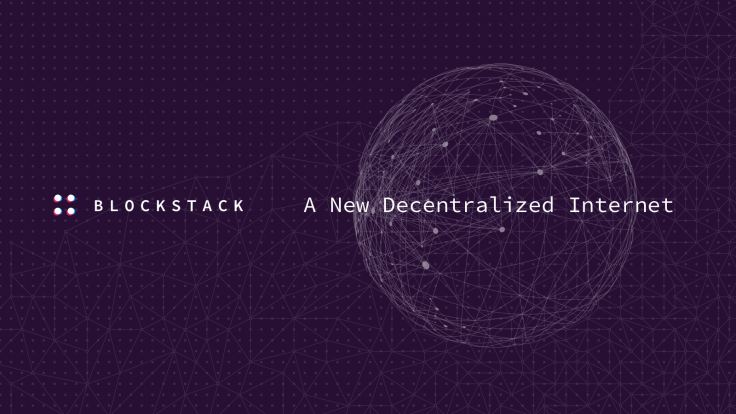Blockstack focuses on building decentralised web amid crypto-token mania
Blockstack's Muneeb Ali refers to Google's motto – 'Don't be evil', and says shouldn't it be, 'can't be evil'?

Over the past year or so, the blockchain space has become overrun with people only concerned with getting wealthy. It's not surprising that a lot of the developer community would like to distance themselves from this distraction and stay focused on rebuilding the internet.
Muneeb Ali, co-founder of Blockstack, sees it as a weird combination of genuine innovation mixed with this persistent noise of speculators, pumpers, scammers etc. He said: "When the price of these crypto-tokens is low, it's a great time for developers because they can just get their heads down, focus on building the protocols and the technology that they love building.
"But whenever there's a bull market you get all this crypto-token trading and it starts attracting all sorts of noise and the wrong kind of crowd. It's very distracting.
"It also gives the entire space a bad name. Imagine the amount of spam people are getting on a daily basis, saying, come and check out our new decentralised something project and here's our white paper and here's a token sale that's about happen."
The whole idea of a decentralised Web 3.0 is summed up by Ali when he refers to Google's motto – "Don't be evil", and says shouldn't it be, "can't be evil"?
Blockstack removes trust points from the middle of the network and uses blockchains to secure critical data bindings. The areas it covers include, identity, discovery, and storage.
The project was born out of some of the earliest experimentation on the Bitcoin blockchain. One of Satoshi Nakamoto's parting shots in 2010 was to suggest BitDNS, a secure and decentralised domain name service borrowing Bitcoin's mining power. This was followed by Namecoin, the first fork of Bitcoin; upon which the first iteration of Blockstack was built.
The engineers who are building the decentralised web using blockchains all know each other. This is interesting because rather than being in competition with each other, they are all battling the common problems brought about by massive centralised institutions.
"I'm friends with people who are running some of these projects like Juan (Benet) at IPFS, or Zooko (Wilcox-O'Hearn) at Zcash," said Ali. "This is a community where I think there is less of a competition between people. We are actually friends; when we meet at conferences we talk about how we can help each other. We will brainstorm technical solutions together, and if one project figures out something that is actually better, other projects are completely open to just using that.
"Part of the reason is that we are a very small group. I know that the cryptocurrency markets might seem like they have a large market cap, but if you look under the surface, the raw number of people involved is very small, it's a handful of people.
"We know it's really early days. The real challenges are ahead of us. And the real problems are actually taking away the giants, like Amazon, S3 or Google cloud, or Facebook and things like that."
Last year Blockstack released its own browser. There are a few projects building browsers in a decentralised context; Ethereum/Mist, Brave, and non-blockchain protocols like Beaker Browser. So, can we expect to see more of a proliferation of small players in the future, bearing in mind the efficiency paradigm of web has always gravitated towards the few?
"What we are focusing more on is building the core infrastructure, the network for Blockstack, but also the developer tools around how developers can actually start building applications.
"We want to integrate with as many browsers as possible, and in our latest release we actually integrated with Chrome and Safari, instead of like making people download a standalone browser.
"Again going back to how this community is really friendly, so for example, Brendan Eich at Brave, we've had conversations with him. They were very open to integrating some of the Blockstack functionality into the Brave browser itself.
"We also realised that building a browser is almost like a full time job of a company, just keeping it secure, just making sure it's fully updated and stuff like that."
The lower layers of the internet are kind of decentralised, the transport layer where TCP/IP is, and connections are made. Most of the centralisation happens at the topmost layer, the application layer. This is where things like the domain name system operates in a federated manner, involving large security certificate providers like Verisign.

Doing decentralised domain names has been a tricky problem in computing. The problem is famously stated in Zooko's Triangle; there are three desirable properties – decentralisation, security, and human readable names – and no single name can achieve more than two. However, the emergence of blockchain-based probable consensus posits solutions to the problem.
Ali said: "It's a subset of this problem of discovery in general. How do you discover some computer resource initially, like how do I know that I'm going to cnn.com and it's the right cnn.com? Then this problem becomes a little bit more complicated when human readable names are involved.
"Imagine a public key which anyone can generate as a name but it's gibberish; you can share your public key and nobody is going to remember it, but it does have other properties, it is decentralised. On the other hand, Twitter has human readable names, but then Twitter the company manages the name space.
"For a long time people thought that you couldn't have human readable names in a decentralised way, but then it turned out that it's actually possible. Namecoin implemented that in 2011 and then we implemented a system where people can register human readable names in a fully decentralised way in 2013/2014."
There are other interesting approaches to the problem of decentralised discovery. For example, IFPS refers to everything by the hash on the file and uses content addressing at the HTTP layer, rather than creating an identifier that addresses things by location.
"IPFS is in a different school of thought when it comes to naming. They use hashes and don't use human-readable names. The idea is that you can search for content (like most people use Google) instead of remembering it by a name. We, however, believe that human-readable names are important.
"Both approaches have pros and cons. Decentralised naming is a hard technical challenge in general and you need to make tradeoffs. It's good that projects like Blockstack and IPFS are exploring different design tradeoffs, this gives more options to developers."
Blockstack's forthcoming Signature Fund event in Berlin features a great line up of speakers, including Edward Snowden, Nick Szabo and Elizabeth Stark.






















